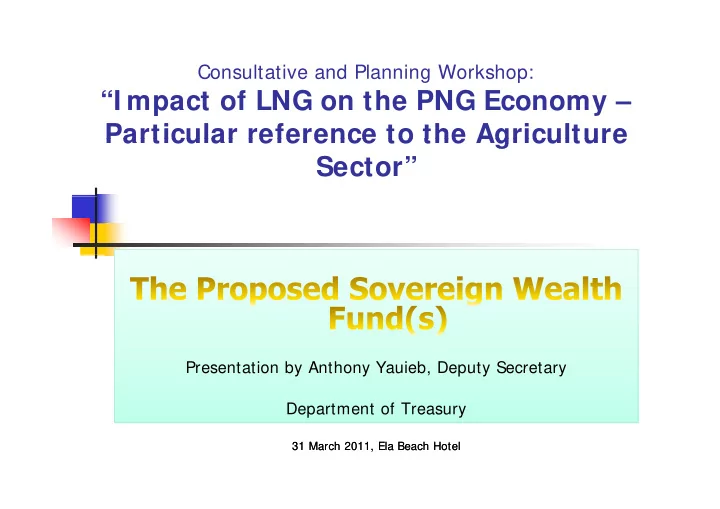

Consultative and Planning Workshop: g p “I mpact of LNG on the PNG Economy – Particular reference to the Agriculture Particular reference to the Agriculture Sector” Presentation by Anthony Yauieb Deputy Secretary Presentation by Anthony Yauieb, Deputy Secretary Department of Treasury 31 March 2011, Ela Beach Hotel 31 March 2011, Ela Beach Hotel
Outline of presentation The PNG LNG Sector Economic Issues and Challenges Sectoral Impacts of the LNG Sectoral Impacts of the LNG Analysis – ACIL Tasman Policy Options – to mitigate LNG economic implications implications PNG Sovereign Wealth Fund(s) 2
The PNG LNG Sector Major economic and development implications: Substantial long term revenues from PNG LNG Substantial long term revenues from PNG LNG project Potenti l to t Potential to transform economy n fo m e onom Opportunity to underpin national development 3
Economic I ssues and Economic I ssues and Challenges Macroeconomic Stability Exchange rate appreciation/Dutch Disease Monetary Policy Issues Absorptive Capacity Absorptive Capacity PNG’s development needs p 4
The Exchange Rate/Dutch The Exchange Rate/Dutch Disease Caused by a large inflow of foreign currency The significant revenues from LNG project are likely to contribute to a stronger exchange likely to contribute to a stronger exchange rate The effects of Dutch Disease – decrease competitiveness of non-mineral sectors of the economy 5
Monetary Policy Issues Increase in domestic liquidity has adverse i implications – increase inflationary pressures li ti i i fl ti BPNG mopping up excess liquidity increased cost of monetary policy operations Appreciation of Kina reduces the value of foreign Appreciation of Kina reduces the value of foreign reserves High Inflation would hurt the poorest in the High Inflation would hurt the poorest in the community the most 6
Absorptive Capacity of the Absorptive Capacity of the Economy PNG Economy has limited capacity to absorb additional Government spending from LNG revenues Government spending from LNG revenues Too much Government spending can cause the economy to overheat and inflation to get out of control Excess demand pressures increase imports and inflation Absorptive capacity can be categorized under 3 distinct measurement constraints: t t i t 1) Macro-economic constraints Q 2) Quantitative constraints 3) Institutional constraints Economic modeling on absorptive capacity is very complex Economic modeling work currently undertaken by AusAID and IMF E i d li k tl d t k b A AID d IMF 7
Sectoral I mpacts of the LNG A range of non-traded exposed sectors will likely expand Construction Transport Communication Services Construction, Transport, Communication, Services LNG may disadvantage export and import competing sectors of the economy Agriculture, manufacturing and tourism could be badly affected if not managed properly Negative impacts of a higher exchange rate may reduce the egat e pacts o a g e e c a ge ate ay educe t e economic activity and employment across many provinces in PNG Analysis and modeling by ACIL Tasman indicates: Real Exchange Rate may appreciate by 11 per cent in the long run R l E h R t i t b 11 t i th l Reduce the external competitiveness of domestic non-mineral export sectors eg. Agriculture and forestry Potential large adverse impact on value added in the agricultural sector 8
ACIL Tasman ACIL Tasman – Modelled impact of PNG Modelled impact of PNG LNG in the Agricultural Sector (%) 9
ACIL Tasman ACIL Tasman – Modelled impact of PNG Modelled impact of PNG LNG on Employment (%) 10
Policy option – Sovereign Policy option Sovereign Wealth Fund (SWF) Can Dutch Disease be avoided? Cause of Dutch Disease is an inflow of foreign currency into PNG It can be reduced by not bringing all of the foreign currency into PNG Policy option to minimise the effects of Dutch Disease is through creation of an Dutch Disease is through creation of an offshore SWF 11
Offshore SWF(s) Size of LNG revenues have substantial macroeconomic implications that need to be carefully managed implications that need to be carefully managed Exchange rate appreciation / Dutch disease Cost and operation of Monetary Policy Risk of overheating the domestic economy Adverse effects in non-mineral sectors of the economy Offshore arrangements: Offshore arrangements: State will retain full ownership and control Promote macroeconomic stability; Underpin long term development and socio-economic objectives Help protect non-mineral sector industries Are robust transparent and effective Are robust, transparent and effective 12
PNG SWF Model Establish a consolidated pool of offshore funds with three coordinated and integrated Funds coordinated and integrated Funds Infrastructure Fund 1) Stabilization Fund 2) Future (Savings) Fund Future (Savings) Fund 3) 3) Fully integrating SWF with the budget and fiscal framework Governance, transparency, disclosure, accountability and asset management rules be based on international best practice Drawdown rules be developed to ensure prudent macroeconomic management while supporting development macroeconomic management while supporting development objectives SWF to be overseen by an independent board Investment be undertaken by offshore investment manager 13
OFF-SHORE POOL OF FUNDS • LNG Dividends • LNG Dividends • Investment earnings • Investment earnings • LNG Tax Revenue • LNG Tax Revenue • Other Mineral/Petroleum Tax & Dividend Revenue • LNG Dividends LNG Dividends • LNG & other Kroton No.2 Mineral/Petroleum Revenue Macro ‐ Subject to Absorptive Capacity Stability •Coordinated Drawdown Channeled through the Budget Process Fiscal C Control t l • Reporting/Allocation • Allocation • Allocation Accountability & Accountability & NATI ONAL BUDGET NATI ONAL BUDGET NATI ONAL BUDGET NATI ONAL BUDGET Transparency 14
15 Thank you for listening The End
Recommend
More recommend